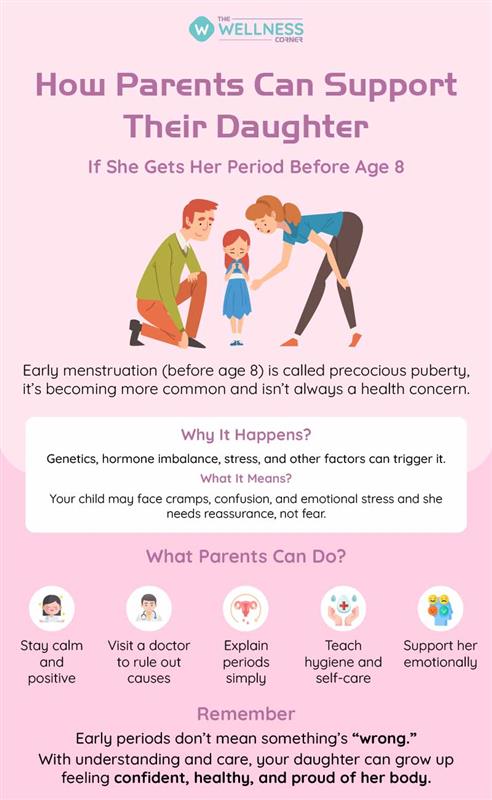If Your Daughter Gets Her Period By Age 8: What Parents Need To Know?
27 days ago
5 minute read.

When you think of childhood, you imagine carefree days filled with school, playtime, and simple joys—not sanitary pads and menstrual cramps. Yet, some parents are faced with a surprising reality: their daughter gets her first period as early as 8 years old.
For many, this can be shocking. After all, we usually expect menstruation to begin during the teenage years. But early puberty—sometimes called precocious puberty—is becoming more common worldwide. While this doesn’t always signal a health problem, it’s something parents need to understand, monitor, and support their child through.
This blog takes you through why early periods happen, how they affect a child, and what you as a parent can do to ensure your daughter feels safe, healthy, and confident.
Also Read: Have Headaches During Periods? This Could Be The Reason

What’s Considered “Normal” in Menstruation?
Most girls experience menarche (their first period) between the ages of 10 and 15, with the global average being 12 years old. Doctors consider it early puberty if menstruation begins before age 8 in girls (or before age 9 in boys for puberty signs).
So, while it may feel unusual, getting periods at age 8 falls into the category of precocious puberty. The key question then becomes: Why does this happen?
Also Check: Can You Wash Your Hair During Menstruation?
Why Might Periods Start at Age 8?
Several factors may contribute to early menstruation, ranging from genetics to environment. Here are the most common causes:
- Genetics – A strong family history can play a role. If mothers or grandmothers started their periods early, the child may experience the same.
- Hormonal imbalance – Sometimes, the body releases puberty hormones (estrogen and progesterone) earlier than expected.
- Health conditions – Rarely, early puberty may be linked to thyroid disorders, ovarian cysts, or brain-related conditions that affect hormone release.
- Nutrition and weight – Higher body weight and childhood obesity are strongly linked to earlier menstruation. Fat tissue produces estrogen, which can trigger early puberty.
- Environmental triggers – Modern lifestyle exposures, such as plastics, processed food, and chemicals that mimic hormones (endocrine disruptors), may play a role.
- Stress and psychosocial factors – Stressful environments or trauma have been linked with earlier onset of puberty in some studies.
While most cases are harmless, it’s always best to consult a doctor to rule out underlying medical conditions.
How Early Periods Affect a Child?
Early menstruation doesn’t just mean the start of monthly cycles. It brings with it a mix of physical, emotional, and social challenges—especially because at age 8, children are still very young to fully grasp what’s happening.
1. Physical Impact
- Younger children may struggle with cramps, heavy flow, and managing period hygiene independently.
- Early puberty may also cause the child’s bones to mature faster, which can affect final adult height.
- Some girls may also experience acne, breast development, and rapid growth earlier than their peers.
2. Emotional and Psychological Impact
- A child may feel embarrassed, confused, or even frightened.
- She may not be emotionally ready to handle changes in her body.
- There is a risk of low self-esteem, anxiety, and mood swings.
3. Social Impact
- She may feel “different” from her classmates who haven’t started puberty yet.
- Peer teasing or bullying can worsen feelings of isolation.
- Teachers may not recognize her needs unless informed.
How Parents Can Support Their Daughter?
If your daughter gets her period at age 8, the way you respond can make all the difference in how she views her body and herself. Here are practical ways to help:
1. Stay Calm and Positive
Children pick up on their parents’ reactions. If you appear anxious, she may feel there’s something “wrong” with her. Keep your tone supportive and calm.
2. Visit a Doctor
Always schedule an appointment with a pediatrician or pediatric endocrinologist. They may:
- Check growth and development.
- Run hormone tests if needed.
- Rule out medical causes.
Sometimes, early puberty may require treatment (such as hormone therapy) to slow down development and ensure healthy growth.
3. Explain Periods in Simple Terms
At 8, children need age-appropriate explanations. Use simple language:
“Your body is starting to mature a bit sooner than most.” Periods mean your body is healthy and getting ready to grow into a woman one day.”
Books, videos, and illustrations designed for kids can also help.
4. Teach Hygiene Step by Step
Practical skills are key:
- How to use and dispose of pads.
- How often to change them.
- Importance of washing hands before and after.
- Carrying a small pouch with pads to school.
You may need to supervise for the first few months until she becomes confident.
5. Provide Emotional Reassurance
Tell her:
- She’s not “weird” or “different.”
- Every girl’s body has its own timeline.
- She can always talk to you about her feelings.
Open communication builds trust and helps prevent shame.
6. Coordinate with School
Inform her teachers or school nurse so they can support her if she needs to excuse herself during class, or if she feels unwell.
7. Encourage a Healthy Lifestyle
- Nutritious diet with fruits, vegetables, protein, and whole grains.
- Regular physical activity like yoga, dance, or cycling.
- Adequate sleep to balance hormones.
This will also help her manage cramps, mood swings, and overall health.

Also a great read: 15 Things Your Teenage Daughter Needs To Know
When to Seek Medical Advice Urgently?
While many cases of early periods are harmless, see a doctor if your daughter:
- Starts menstruating before age 7.
- Shows very rapid development (breasts, pubic hair, sudden height spurts).
- Has severe mood or behavioral changes.
- Has a strong family history of hormonal or thyroid disorders.
Timely medical guidance can prevent long-term complications.
Talking to Your Daughter About Periods
This is perhaps the most important part. Early periods can make a child feel scared or embarrassed if not explained properly. Keep these tips in mind:
- Normalize it: Treat menstruation as a natural body process, not something shameful.
- Use simple analogies: For example, compare periods to the “body’s monthly cleaning system.”
- Encourage questions: Let her ask freely without judgment.
- Address myths: Correct misinformation she might hear from peers.
Remember: your openness now will shape how she views her body for years to come.
Final Thoughts
If your daughter gets her period by age 8, it may feel like childhood is ending too soon. But with the right knowledge and support, she can handle this transition confidently.
- Don’t panic. Early puberty is not uncommon.
- Seek medical advice. Always rule out underlying conditions.
- Educate and empower. Teach her hygiene, self-care, and body positivity.
- Support emotionally. Remind her she is not alone and has nothing to be ashamed of.
Every girl’s journey is unique. What matters most is that she feels safe, supported, and confident in her own body, no matter when her periods begin.
Leave a Comment
Related Articles
Health Checks @ Home
Service
Explore
© 2025 Truworth Health Technologies Pvt. Ltd.




